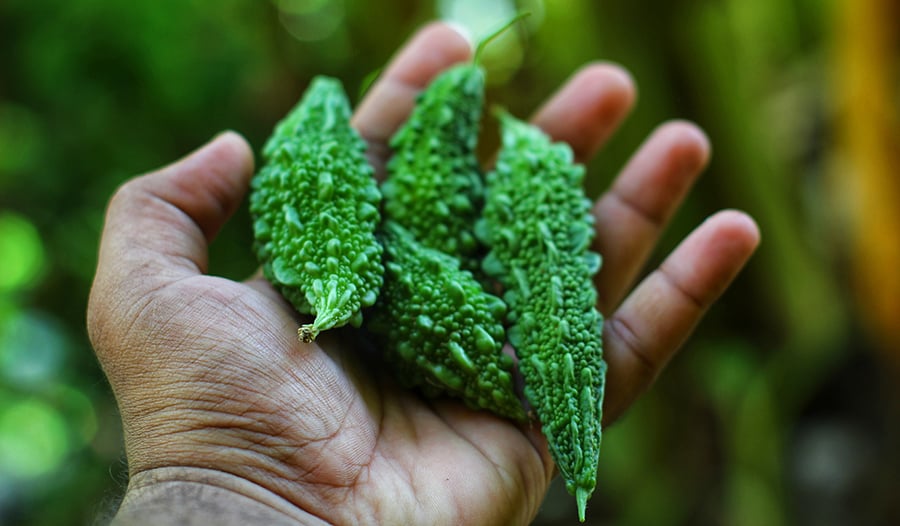Bitter Melon: Top Benefits, Nutritional Value, and More

A climbing shrub found primarily in India, Korea, China, and Bangladesh, bitter melon also grows in the tropical regions of East Africa, the Amazon, and the Caribbean. Also called bitter gourd, bitter squash, or balsam pear, Momordica charantia is the bitter melon’s scientific name. Belonging to the Cucurbitaceae family, bitter melon is closely related to cucumber, pumpkin, and zucchini. Bitter melon is used as a traditional medicinal plant in countries worldwide, including Ghana, Brazil, China, Haiti, Columbia, Panama, and Peru. The most common traditional use is for treating diabetes; however, it is also used to treat gout, menstrual cramps, psoriasis, eczema, rheumatism, jaundice, and constipation by a variety of indigenous cultures.
Recent studies have revealed bitter melon has antibacterial and antiviral properties. Momordica charantia extracts have also been shown to be effective in the treatment of ulcers, pain, and hypertension. Here we will explore the top six research-based benefits of bitter melon and how it could improve your health and well-being.
Bitter Melon May Help Reduce Blood Sugar
Having a long history of being used by indigenous cultures around the globe for diabetes, new research shows that bitter melon can help regulate blood sugar levels. It is thought to encourage the release of insulin and improve insulin resistance.
Two studies found that taking 2,000 mg of bitter melon daily decreased both blood sugar and hemoglobin A1c levels. Hemoglobin A1c is a test that shows how well blood sugars have been regulated over the past 3 months.
Another study found fructosamine was significantly reduced with bitter melon supplementation. Fructosamine is a substance that is created when glucose binds to proteins. If fructosamine levels are high, this means that over the past three weeks, the average blood glucose was elevated. Monitoring the trend of fructosamine values will give better insight into blood glucose management than a single reading.
Eating bitter melon may aid in the cellular use of glucose, including helping it move out of the blood and into your body tissues such as the liver, fat or adipose tissue, and muscle tissue where it can be used and/or stored for future use.
Bitter melon has phytonutrients that act similarly to insulin, helping glucose enter your body cells where it can be used for energy and moving it out of your blood where it can cause many problems. Bitter melon may also block the conversion of other nutrients to glucose, which helps decrease blood sugar levels.
While bitter melon scientific research shows it can lower blood sugar, it is not an approved treatment for blood sugar disorders, including diabetes and prediabetes. Caution should be taken when taking blood sugar-lowering medications and consuming large amounts of bitter melon or concentrated supplements because bitter melon can significantly lower blood sugar levels. Combining bitter melon with blood-sugar-lowering medications could cause the blood sugar levels to drop too low and cause adverse effects. Blood sugar levels could drop dangerously low if taking bitter melon with insulin for example.
Bitter Melon May Help Decrease Cholesterol Levels
High LDL cholesterol levels can lead to heart and vascular disease. Many animal studies have shown that bitter melon may decrease cholesterol levels.
One study found that LDL cholesterol (bad cholesterol) levels were significantly reduced with the consumption of bitter melon extract.
In mice studies, the Koimidori variety of bitter melon was found to be the most effective in lowering hepatic (liver) triglyceride levels. The researchers concluded that present and previous studies clearly indicate that bitter melon, primarily the Koimidori variety, exhibits potent liver triglyceride-lowering ability.
Bitter Melon Could Help Improve Digestion
High in fiber, bitter melon can help pass food through the intestines. Fiber passes through the intestines quite slowly, helping bulk up your stool by increasing its weight and size while softening it.
Fiber is also important for a diverse and healthy gut microbiome and provides a substrate for good bacteria in the gut. Eating sufficient fiber can help keep you regular and keep the digestive tract flowing properly.
Not only is dietary fiber intake important in gut health, but it is also associated with overall metabolic health including insulin sensitivity, cardiovascular disease, chronic inflammation, and overall mortality. Studies have found that the Western diet is impoverished of fiber. One concludes that given the abundance of scientific evidence that corroborates the many varied health benefits of dietary fiber, and the risks associated with lack of fiber in the diet, the optimization of fiber in our diets is an important public health strategy to improve overall health, resulting in substantial future health benefits for the population.
With two grams of fiber per 100-gram serving, bitter melon is a great source of fiber to add to your diet providing 8% of your daily fiber requirements.
Bitter melon can help with constipation or irritable bowel syndrome (IBS) due to its laxative-type properties. Its laxative-like properties can be attributed to compounds called anthraquinones found in bitter melon. As a digestive stimulant, it can also help relieve hemorrhoids and indigestion.
Bitter Melon: A Nutrient Dense Food
Packed full of vitamins and minerals, bitter melon is a nutrient-dense powerhouse that makes a great addition to any lifestyle.
Boasting 44% of the daily value (DV) of vitamin A, and 99% of the DV of vitamin C, a 100-gram serving of bitter melon can have positive impacts on your health. Vitamin A is known to help keep your eyes healthy, and vitamin C has a vital role in immune health and disease prevention.
Bitter melon is also rich in minerals, including zinc, potassium, and iron.
Zinc is an important mineral in growth and development and has a major role in wound healing, thyroid function, and blood clotting.
Potassium helps the body with fluid regulation, muscle contraction, and helps normalize blood pressure.
Iron is needed to make hemoglobin, a protein that carries oxygen in our red blood cells, as well as myoglobin, a protein that provides oxygen to muscles. Low iron levels can lead to iron deficiency anemia, a common condition.
Bitter Melon's Powerful Antioxidant Benefits
Catechin, epicatechin, chlorogenic acid, and gallic acid are powerful antioxidants found in bitter melon. Antioxidants protect the body from free radicals that cause oxidative stress, damaging your cells throughout the body. Oxidative damage leads to premature aging and contributes to chronic health conditions like heart disease, diabetes, and Alzheimer’s disease.
By consuming bitter melon supplements, you may reduce your risk of chronic illness and premature aging.
Bitter Melon, Body Weight, and Obesity
Bitter melon extract has positively impacted body weight gain and fat deposition.
Many studies suggest bitter melon can reduce body weight in high-fat diet-induced obesity in lab animals. One study showed bitter melon supplementation not only prevented body weight gain, but also prevented visceral fat (fat around the vital organs) mass significantly in mice fed high-fat diets. Yet another finding stated that bitter melon also decreased white adipose (fat) tissue in these mice.
An additional study found bitter melon seed oil supplementation reduced fat mass and body weight in mice fed a high-fat diet.
Bitter melon has also been shown to inhibit adipocyte hypertrophy or overgrowth of fat cells.
Adding bitter melon to your diet may help you lose weight and decrease your body fat, reducing obesity and the risk associated with excessive visceral fat.
Potential Side Effects
While bitter melon has a plethora of health benefits, overconsumption can have some potential side effects.
Diarrhea and abdominal pain have been associated with overconsumption of bitter melon.
Due to its blood sugar-lowering effects, caution should be taken when consuming bitter melon with blood sugar-lowering medications.
Pregnant women should avoid bitter melon, as it could cause bleeding and contractions during pregnancy.
Talk to your doctor before incorporating bitter melon into your diet or supplement routine, especially if you are pregnant, nursing, or taking diabetic medications.
Takeaway
Bitter melon has been used as a traditional medicinal plant in a variety of indigenous cultures around the world. Modern-day science has validated many of the traditional uses of the plant.
The blood sugar-lowering abilities are perhaps the most notable research findings, as bitter melon has been used traditionally for diabetes and blood sugar regulation for centuries.
Other noteworthy possibilities of consuming bitter melon include potential cholesterol-lowering effects, digestive support, and assistance with weight loss evidence.
Considering the variety of vitamins and minerals bitter melon has, it’s a healthy addition to any diet and supports a health-conscious lifestyle.
References:
- Alam MA, Uddin R, Subhan N, Rahman MM, Jain P, Reza HM. Beneficial role of bitter melon supplementation in obesity and related complications in metabolic syndrome. J Lipids. 2015; 2015:496169. doi:10.1155/2015/496169
- Liu Z, Gong J, Huang W, Lu F, Dong H. The Effect of Momordica charantia in the Treatment of Diabetes Mellitus: A Review. Evid Based Complement Alternat Med. 2021; 2021:3796265. Published 2021 Jan 16. doi:10.1155/2021/3796265
- Wilcox G. Insulin and insulin resistance. Clin Biochem Rev. 2005;26(2):19-39.
- Marisol Cortez-Navarrete, Esperanza Martínez-Abundis, Karina G. Pérez-Rubio, Manuel González-Ortiz, and Miriam Méndez-del Villar. Momordica charantia Administration Improves Insulin Secretion in Type 2 Diabetes Mellitus. Journal of Medicinal Food.Jul 2018.672-677.http://doi.org/10.1089/jmf.2017.0114
- Pizzino G, Irrera N, Cucinotta M, et al. Oxidative Stress: Harms and Benefits for Human Health. Oxid Med Cell Longev. 2017; 2017:8416763. doi:10.1155/2017/8416763
- Kinoshita H, Ogata Y. Effect of Bitter Melon Extracts on Lipid Levels in Japanese Subjects: A Randomized Controlled Study. Evid Based Complement Alternat Med. 2018; 2018:4915784. Published 2018 Nov 8. doi:10.1155/2018/4915784
- Senanayake GV, Maruyama M, Shibuya K, et al. The effects of bitter melon (Momordica charantia) on serum and liver triglyceride levels in rats. J Ethnopharmacol. 2004;91(2-3):257-262. doi: 10.1016/j.jep.2003.12.026
- Barber TM, Kabisch S, Pfeiffer AFH, Weickert MO. The Health Benefits of Dietary Fibre. Nutrients. 2020;12(10):3209. Published 2020 Oct 21. doi:10.3390/nu12103209
- Carazo A, Macáková K, Matoušová K, Krčmová LK, Protti M, Mladěnka P. Vitamin A Update: Forms, Sources, Kinetics, Detection, Function, Deficiency, Therapeutic Use and Toxicity. Nutrients. 2021;13(5):1703. Published 2021 May 18. doi:10.3390/nu13051703
DISCLAIMER:This Wellness Hub does not intend to provide diagnosis...
















































































 Table of Contents
Table of Contents


